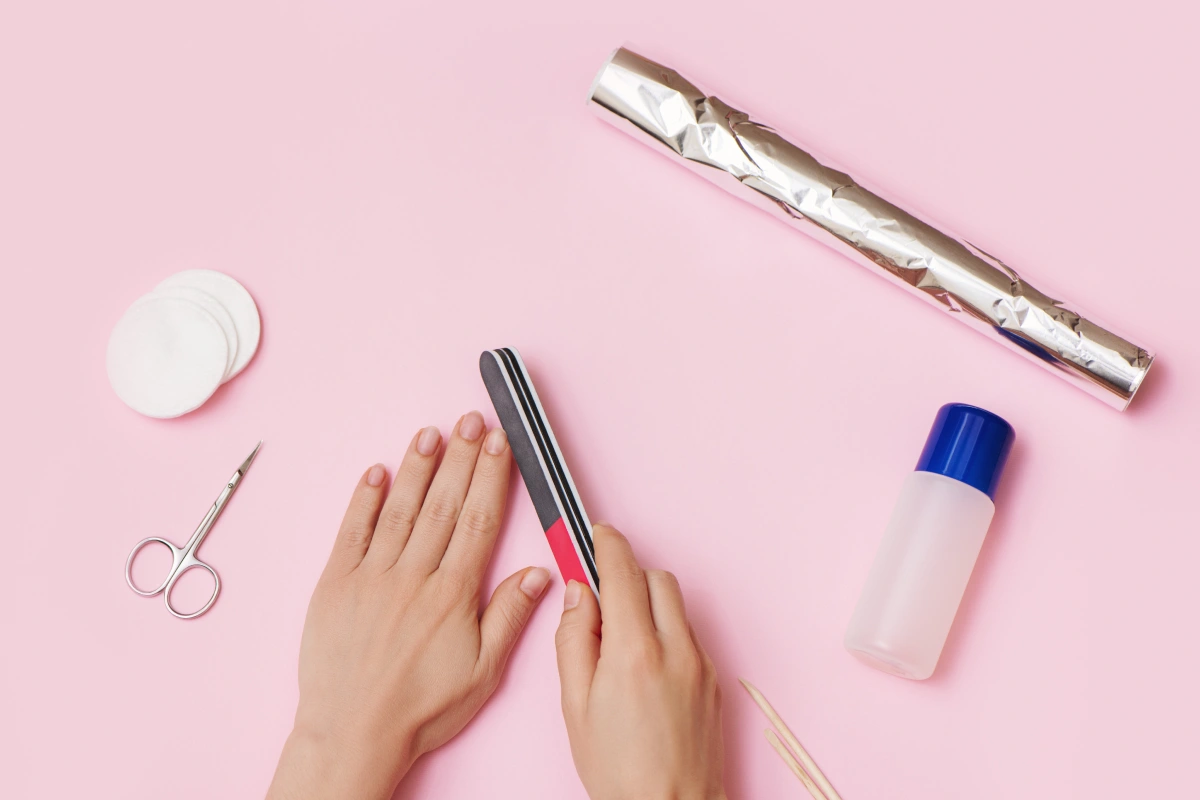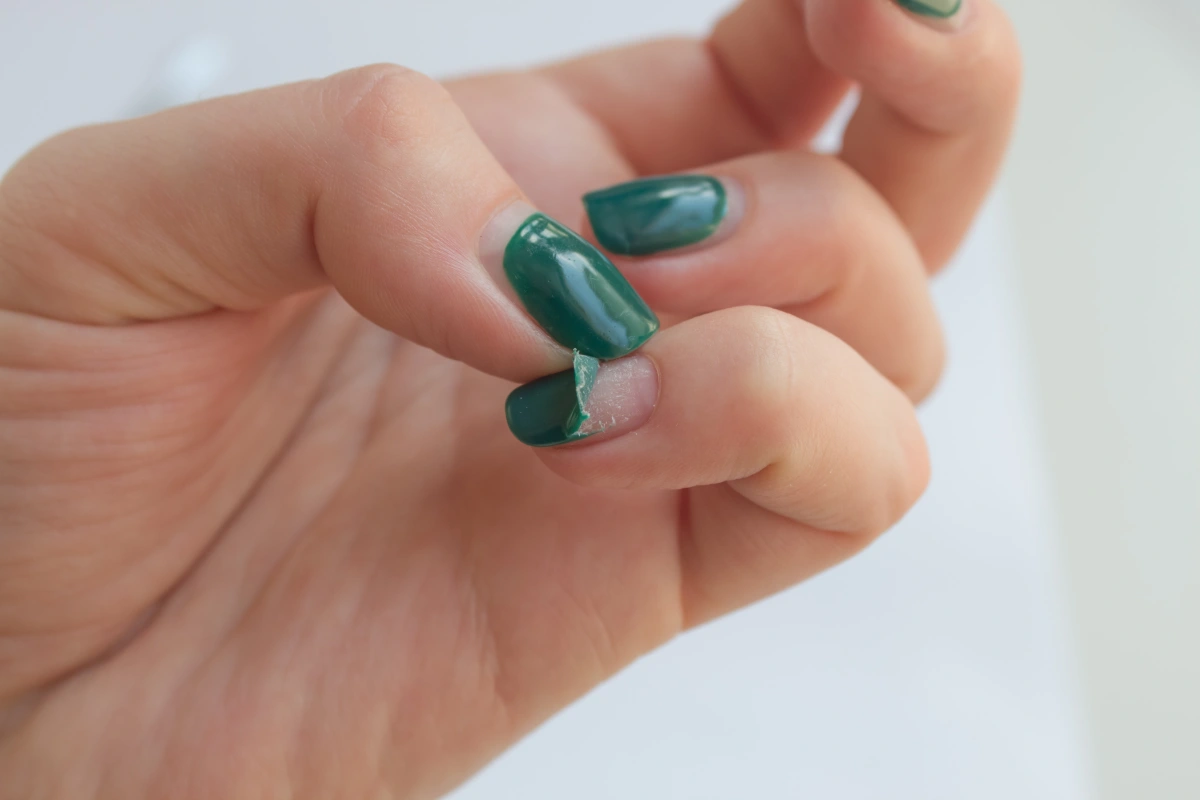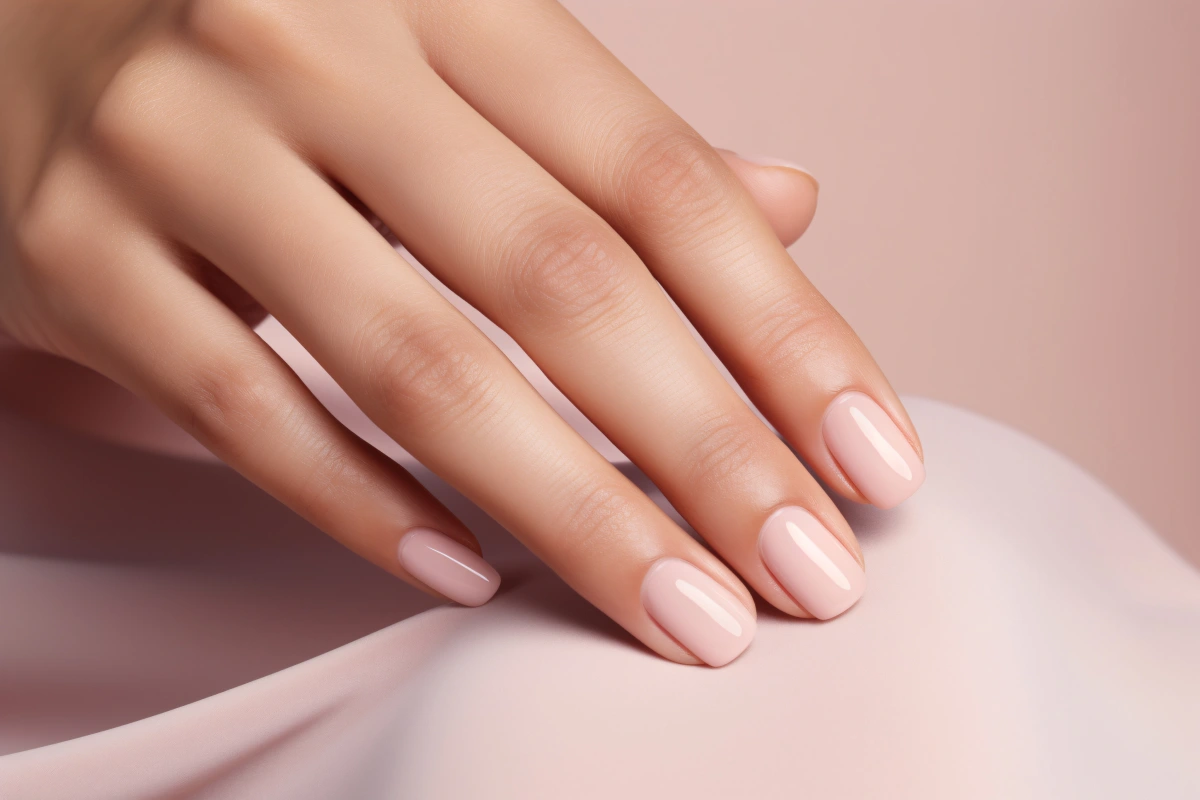Why Gel Polish Removal Goes Wrong
Gel nail polish is tough by design. It survives dishes, workouts, and long weeks because it cures under a light and bonds to the nail surface. Yank it off the wrong way and you will lift layers of your natural nail, cause white spots, and end up with damaged nails.

The Only Tools You Really Need
Gather a nail file, a fine-grit buffer, pure acetone, cotton balls, aluminum foil or tin foil, a cuticle pusher or orange stick, a paper towel, and cuticle oil. These make the slow process safe and clean.
Skip This: The Peel and Pray Method
Peeling is quick, but it strips the top layer of the nail plate. If you can “pop” off a corner, stop. That sticky base coat is gripping the nail. Peeling creates thin, bendy nails that split when you type or open a soda can.
Step 1: Gently File the Shiny Layer
Use a nail file to break the seal on the top coat. You are not sanding wood. A few light passes remove the glossy finish. Dust the fingers with a dry paper towel so the foil will stick later.
Step 2: The Foil Method That Actually Works
Soak cotton balls in pure acetone. Place one on each fingernail and wrap tightly with aluminum foil. The soaked cotton should touch only the polish, not the skin. This foil method prevents acetone from evaporating, allowing it to soften the gel.
Step 3: Wait Like a Pro, Do Not Rush
Set a timer for 12 to 15 minutes. If the gel was applied thickly, wait a few more. Rushing is how people scrape and create grooves. Warm water on the outside of your hands for a minute can help acetone work, but never soak nails in hot water first.
Step 4: Lift, Do Not Scrape
Open one wrap. If the gel looks puffy and the edges lift, use an orange stick to gently push the loosened product toward the free edge. If you feel resistance, stop. Rewrap with a fresh, soaked cotton ball and let the acetone keep working.
Step 5: Buff, Rinse, and Oil
When most of the gel is off, use a fine-grit buffer to smooth the remaining polish. Wash with mild soap and warm water. Dry well, then apply cuticle oil and rub it into the surrounding skin. Oil replaces what acetone takes away.
What Not to Use on Your Natural Nail
Do not pry with a metal tool. Do not use a coarse file on the nail bed. Do not use regular nail polish remover as your primary solvent. It is gentle on traditional nail polish, but it barely moves cured gel.
Pure Acetone vs Regular Nail Polish Remover
Acetone nail polish remover with additives is fine for light gel. Pure acetone works faster and more evenly. Home acetone paired with the foil method removes layers without scraping when you file the top layer first.
Protect the Surrounding Skin
Acetone dries skin fast. Keep it off the cuticles by applying a thin layer of petroleum jelly around the nail before wrapping. Wipe it off after removal so oil and lotion can soak in.
Special Cases: Builder Gel and Thick Top Coat
Hard builder gel, heavy glitter, or a thick top coat may require two rounds. Gently file the top layer again, rewrap with soaked cotton, then check every 5 minutes. The goal is to soften, not to drill.
When Your Old Manicure Fights Back
If remaining polish clings near the cuticle area, use an orange stick and a feather-light touch. The base coat lives there. For stubborn polish, a pro at a nail salon has e-file control and can remove gel without heat or rings of fire.

Why DIY Can Leave White Spots
White spots often come from scraping or peeling. They are tiny air pockets where the nail plate was lifted. Give nails a week of oil and gentle care, and they usually smooth out as the nails grow.
Acrylic Nails Are Different
Acrylic nails and gel or acrylic overlays use liquid monomer and powder polymer. They require a different removal process. If you’re unsure what is on your hands, ask a nail technician before reaching for acetone.
Keep Your Nail Health First
If your nails feel thin, skip gel for two weeks. Wear regular nail polish while you recover. A basic manicure with a strengthening base coat is a smart reset.
The Right Way to Remove Gel Nail Polish at Home
Lightly file the shiny layer. Wrap soaked cotton under foil. Wait. Gently push. Rewrap if needed. Buff smooth. Oil and moisturize. That is how to remove gel nail polish without tears, peeling, or regrets.
Common Mistakes That Cost You Weeks
Using old cotton that is barely damp. Letting wraps slip off. Filing is too hard. Using hot water to “speed things up”. Scraping with a metal cuticle pusher. Each one trades five saved minutes for five weeks of weak nails.
Signs You Should Book With a Pro
If you have builder gel, thick nail art, or lifting that looks stuck, let a nail technician finish the job. At Pink of Tampa, we gently remove gel with controlled pressure, clean wraps, and a calm pace, ensuring your natural nail stays smooth.
Aftercare That Actually Works
Apply cuticle oil in the morning and evening for three consecutive days. Wear gloves for cleaning. File only the tips if they feel rough. A thin layer of clear polish can protect nails while you plan your next manicure.
Why Your Nail Tech Cares
We want you to love your nails between visits. When gel is applied correctly, the next gel manicure adheres better, lasts longer, and has a glassy finish from base coat to top coat.
A Note About Special Occasions
If you have a wedding or vacation coming up, plan removal 48 hours before your nail appointment. That timing lets nails rehydrate so the new set bonds properly.
Quick Checklist
File the shiny layer. Wrap soaked cotton. Foil tight. Wait 12 to 15 minutes. Gently push. Rewrap if needed. Buff soft. Wash and oil. No peeling. No scraping.

Book Gentle Removal in Tampa
Prefer zero stress. Visit Pink of Tampa for safe removal and a fresh gel polish or classic color. Our techs use clean wraps, soft tools, and patient hands so your nails leave smooth.
FAQ
What removes gel the fastest at home?
Pure acetone, using the foil method, removes gel polish faster than regular nail polish remover.
How long should I soak?
Most sets release in 12 to 15 minutes. Thick glitter or extra top coat can take a little longer.
Can I use warm water to help?
Warm water on the outside of wraps is fine. Do not soak nails in hot water before acetone.
What tool should I use to lift gel?
Use an orange stick or a gentle cuticle pusher. If the gel resists, rewrap with soaked cotton.
Why do my nails look chalky after removal?
Acetone dries the surface. Wash, then apply cuticle oil and lotion. The smooth look returns within a day.